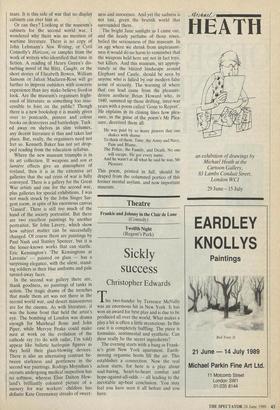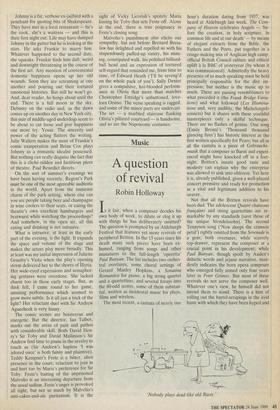Theatre
Frankie and Johnny in the Clair de Lune (Comedy) Twelfth Night (Regent's Park)
Sickly success
Christopher Edwards
This two-hander by Terrence McNally was an enormous hit in New York. It has won an award for best play and is due to be produced all over the world. What makes a play a hit is often a little mysterious. In this case it is completely baffling. The piece is formulaic, sentimental and synthetic. Can these really be the secret ingredients? The evening starts with a bang in Frank- ie's grim New York apartment. Earth- moving orgasmic hoots fill the air. This establishes a connection. Now the real action starts, for here is a play about soul-baring, heart-to-heart combat and hope-against-all-odds -- all leading to the inevitable up-beat conclusion. You may feel you have seen it all before and you have. Johnny is a fat, verbose ex-jailbird with a penchant for quoting bits of Shakespeare. They have met in a local restaurant — he's the cook, she's a waitress — and this is their first night out. Life may have dumped Johnny in the gutter but he is looking at the stars. He asks Frankie to marry him. Whatever happened to the second date, she squeaks. Frankie finds him daft, weird and downright threatening in the course of the first act. Any mention of conventional domestic happiness opens up her old wounds. Soon they are screaming at one another and pouring out their tortured emotional histories. But still he won't go. And, dear reader, he hangs about until the end. There is a full moon in the sky, Debussy on the radio and, as the dawn comes up on another day in New York city, this pair of middle-aged underdogs seem to be about to cut loose and give happiness one more try. Yessir. The sincerity and power of the acting flatters the writing. Julie Walters makes the most of Frankie's comic exasperation and Brian Cox plays Johnny as a romantic idealist possessed. But nothing can really disguise the fact that this is a cliché-ridden and factitious piece of theatre. Paul Benedict directs.
On the sort of summer's evenings we have been having recently, Regent's Park must be one of the most agreeable auditoria in the world. Apart from the immense charm of the park setting, where else can you see people taking beer and champagne in wine coolers to their seats, or eating the theatre's own excellent hamburgers and bratwurst while watching the proceedings? And somehow, in the open air, all this eating and drinking is not intrusive.
What is intrusive, at least in the early part of the evening, is the light. It expands the space and volume of the stage and makes the actors play more broadly. This at least was my initial impression of Juliette Grassby's Viola when the play's opening storm delivered her to the shores of Illyria. Her wide-eyed expressions and semaphor- ing gestures were overdone. She lacked charm too in these early stages. But, as dusk fell, I came round to her game, amusing performance which seemed to grow more subtle. Is it all just a trick of the light? Her reluctant duel with Sir Andrew Aguecheek is very funny. The comic scenes are boisterous and energetic. But the director, Ian Talbot, marks out the areas of pain and pathos with considerable skill. Both David Hen- ry's Sir Toby and David Mallinson's Sir Andrew find time to pause in the revelry to touch us (Sir Andrew's hapless 'I was adored once' is both funny and plaintive). Teddy Kempner's Feste is a bitter, alien presence in the court, reluctant to join in and hurt too by Maria's preference for Sir Toby. Feste's baiting of the imprisoned Malvolio is an interesting departure from the usual sadism. Feste's anger is provoked all right, but not so much by Malvolio's anti-cakes-and-ale puritanism. It is the sight of Vicky Licorish's spritely Maria kissing Sir Toby that sets Feste off. Alone at the end, there is true poignancy in Feste's closing song.
Malvolio's punishment also elicits our sympathy, but not before Bernard Bress- law has delighted and repelled us with his stupendously puffed-up vanity, his minc- ing, constipated walk, his polished billiard- ball head and an expression of tortured self-regard that reminded me, from time to time, of Edward Heath (I'll be reveng'd on the whole pack of you'), Sally Dexter gives a compulsive, hot-blooded perform- ance as Olivia that more than matches Christopher Ettridge's unbuttoned, love- lorn Orsino. The verse speaking is ragged, and some of the minor parts are undercast. The set — a marbled staircase flanking Olivia's pillared courtyard — is handsome, and so are the Napoleonic costumes.











































































 Previous page
Previous page